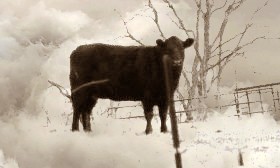 s global warming was met with public apathy it mutated into climate
change, then climate crisis, and now climate catastrophe. The response
too has mutated from “start proposing more nuclear power, then
we'll talk” to skepticism and now ridicule.
s global warming was met with public apathy it mutated into climate
change, then climate crisis, and now climate catastrophe. The response
too has mutated from “start proposing more nuclear power, then
we'll talk” to skepticism and now ridicule.
You'd think everyone would agree: methane in the atmosphere is not a good thing. One side says it causes warming, and the other says it's a waste of good natural gas. But when the media turned political, their stories lost credibility. When science turns political, it loses its connection to reason and common sense. When sensible solutions are off the table, all that remains are the crazy ones, like getting rid of cows (and bulls, we're not sexist here).
Methane is oxidized by sunlight and oxygen, and it survives less than a decade in the atmosphere. Contrary to what you might have heard, its levels are not increasing. It appears that the rate of oxidation is comparable to the rate of emission.
Unlike carbon dioxide, methane is produced almost entirely by natural processes. (Though technically, one could say the same about CO2, which is produced entirely by natural processes like combustion, a natural process that has been harnessed by man.)

It wasn't me, I swear
That's not to say methane couldn't be manufactured. Coal gasification could convert carbon to almost pure methane, aka high-Btu gas (980–1080 Btu/standard cubic ft). The main economic impediments are the cost of eliminating nitrogen, which dilutes its energy content, and poisoning of the catalyst (normally nickel) by sulfur in the coal. Carbon monoxide is an intermediate; while flammable, it is poisonous and must be removed as well. This is done using the water-shift reaction, which converts it to hydrogen (potentially useful as a ‘green’ fuel) and harmless CO2, which can either be vented or sequestered on site for industrial use.
An even better process is coal-by-coal gasification using entrained-flow gasifiers, which operate at 1500°C, thereby preventing fouling from tars. Sadly, the people I talked to in the coal industry are convinced that coal liquefaction and gasification are not economically feasible. If the government wants to pour money somewhere, goal gasification plants are an option.
Hydrogen produced in gasification must be purified to 99.999% using a pressure swing adsorption (PSA) unit before it can be used in vehicle fuel cells. For combustion generators, the less pure hydrogen-rich synthesis gas is adequate.
So why are they blaming the poor cows? It is not cows that produce methane, but the anaerobic bacteria in cows, termites, sewage, and in decaying wood. You'd think the warmers would declare war on termites, which are hated by everyone. Methane is also released unintentionally from underground pockets during coal mining—a process that poses extreme danger to miners—and it's released unintentionally from leaking pipelines.
It would seem that the solution is obvious: kill all the termites, build gasification plants, capture the methane from pockets in coal mines, and burn all of it to CO2 as rapidly as possible. That would simultaneously help our economy and reduce its global warming potential by 20-fold.
Well, rather than doing the obvious thing, the goal seems to be to raise the price of beef to such unaffordable levels that it will create a market for substitutes. Once beef producers are driven out of the market, the factories that produce substitutes will be able to make them “healthier” by manipulating the content to suit every nutritional fad that comes along. Cholesterol and unsaturated fatty acids? Bad for you! Saturated fatty acids? Empty calories! To make the slop that remains edible, they'd have to stuff it full of salt and spices.
How bacteria produce methane
For whatever reason, methane production is barely mentioned in college biochemistry courses. It's a fascinating topic. Methane is produced by methanogens, a type of anaerobic bacteria that react carbon dioxide with hydrogen. Other bacteria use methanol or methylamines. The methane-producing reaction
4H2 + CO2 → CH4 + 2H2O
is highly energetically favorable, with a ΔGo of −130.4 kJ/mol CH4. Even more favorable is the reduction of carbon monoxide to methane and CO2 (−211 kJ/mol):
4CO + 2H2O → CH4 + 3CO2
This might be useful in gasification of high-sulfur coal, as many of these methanogens are thermophilic, living at high temperatures, and can tolerate sulfur.
The bacteria bind CO2 to a methanofuran and reduce it step by step to methane using a variety of cofactors (methanofuran, coenzyme M, tetrahydromethanopterin, and N-7-mercaptoheptanoyl-O-phospho-L-threonine) and enzymes (methyl coenzyme M reductase).
Is it possible to mutate these enzymes to prevent the synthesis of methane, or maybe invent a poison to prevent anaerobic bacteria from releasing methane into the atmosphere? Of course it is, and in this age of climate tunnel vision sooner or later someone will suggest it. But doing so would be a crime against nature. Even the warmers wouldn't suggest such a thing. They'd rather go after the cows, using food fascism such as the banning of soda and junk food done by certain cities as a template.
What would happen to all those cows? They can't be released into the wild, where they'd eventually turn into rampaging hordes of bison-like creatures. We'd have to kill and incinerate them. But that would release CO2. Tough decision. And lest we forget, humans have methanogens as well. Once cows are extinct, guess what's next. It can't be easy being a global warming nut.
nov 14 2021, 6:45 am
